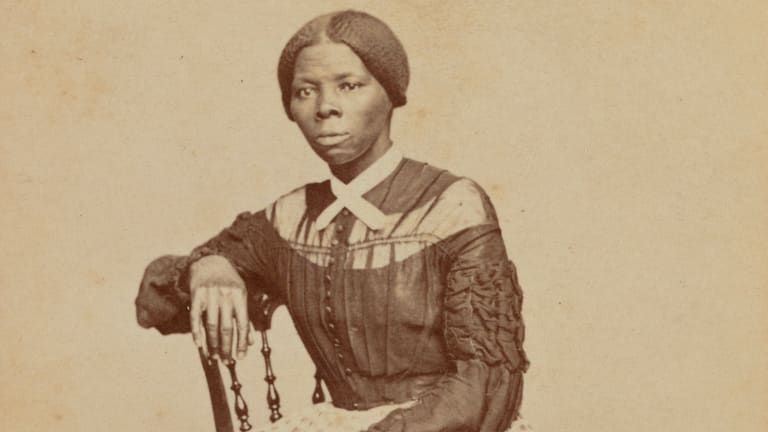Apple Podcasts / Google Podcasts / Spotify
—
The Story is brought to you exclusively by Salesforce, a company that is committed to building a path toward Equality For All.
—
Minty peered into the darkness from the bow of the steamboat, relaying precise directions to the captain. She was watching for keg mines anchored along the shore of the river. They were almost impossible to spot and would kill a careless crew and captain. One by one she identified them and navigated their steamboat safely through the river.
The captain guided the steamboat to shore. Two other steamboats followed under Minty’s leadership.
When the boats had safely crossed and the soldiers were ready, she gave the order. “Attack!”
Union soldiers stormed out from the steamboats, and the assault in the heart of the deep south began.
Minty went ashore as the steamboats blared their whistles. She watched as hundreds of slaves sprinted from the undergrowth and onto the steamboats that the Union soldiers had exited.
They carried what little they owned. Some carried gunny sacks with squealing pigs and squawking chickens. One woman ran down the hill with a steaming pot of rice. Children clung to the backs and necks of their parents.
Minty smiled with delight as the sounds of Union rifles in the distance covered their retreat.
A few Confederate soldiers tried to stop the rush but to no avail. They didn’t know the territory as well as Minty.
That night, 750 slaves were freed from the plantations along the river shore.
And on that night, Minty made history. She was the only woman to lead an armed assault during the Civil War.
Minty couldn’t help but remember her own days as a slave near the banks of that same river. She remembered the filthy dwellings, long days of hard labor… and the beatings.
She remembered her mother—standing up to their owner. Her mother had instilled in Minty a strong set of morals and values. The owner had negotiated a deal to sell Minty’s youngest brother to another plantation owner. Her mother had already lost three daughters that way. She refused to lose another child. So she hid her baby for a month from the owner.
Finally, the owner and the buyer had enough. They stormed toward the slave quarters to take the child. Minty’s mother saw them and yelled through the cracks in the door, “You are after my son! But the first man that comes into my house, I will split his head open!” She brandished a hatchet and the frightened owner backed down and eventually abandoned the sale.
The idea of freedom gnawed at Minty. She wasn’t sure if it was possible, but she knew her soul would die if she didn’t find out.
In her twenties, the stars aligned and Minty got her chance. She had saved enough food, and the owner had left on a trip. The caretaker he left behind had fallen asleep drunk. She escaped and ran all night. The next morning, she arrived in a small Quaker town.
Quakers were friendly to fugitive slaves. She approached the door carefully. Before she could even knock, the woman of the house stepped out.
The woman shoved a broom into Minty’s hands, scanned the road in both directions, and said, “Sweep our yard like you work for us. I’ll get you some food.”
That night, the family hid Minty in the back of a cart and took her to one of their friend’s houses.
After weeks of travel, hiding from slave hunters during the day, and winding through the shadows of the forest by night—Minty crossed the Pennsylvania state line. Tears poured down her cheeks and for the first time in years, she felt relief.
Years later she spoke of that moment and said,
“When I found I had crossed that line, I looked at my hands to see if I was the same person. There was such a glory over everything; the sun came like gold through the trees, and over the fields, and I felt like I was in Heaven.”
She was a new person. She was free. But there was something inside her that made her restless and uneasy.
She thought of her family and friends back home. They should be free, too.
Days later she was working multiple jobs and saving every penny. Somehow… someway… she was going to help them escape.
In December, Minty learned that her niece and two of her children were to be sold at auction. She sprung into action and made her way to Baltimore. There, she hid with a family and sent word to her niece’s husband, John. If he could break them out and meet her in Virginia, she could help get them the rest of the way. John agreed and snuck his wife and children out. They traveled by road and river, and reunited with Minty in Virginia. There, she led them to safety in Pennsylvania. The look on their faces when they arrived was the same feeling Minty had felt. She couldn’t relive the moment directly, but she could give others that joy.
The feeling was indescribable and she was hooked.
Minty began making multiple trips a year to help family members and other slaves who wanted to taste freedom. She poured all of her money and might into the escapes. She learned from each attempt and grew smarter. She traveled in the winter when the days were short and the cold weather kept most indoors. She left on Saturday evenings—because newspapers wouldn’t post notices about escaped slaves until Monday mornings. She made contacts along the way with ministers, Quakers, and free black men. Many of them would offer boats, shelter, food, and transport for her missions.
Minty carried a revolver—for both protection… and insurance. On one trip, morale was particularly low for a group of fugitive slaves on the road to freedom. One man said, “I should go back to the plantation. I had food and clothing. I was warm.”
She responded, “You are not going back!”
He stood in defiance and said, “You will never tell me what to do!”
The calculus of the situation filled Minty’s mind.
The man stood and started to make his case to the others in their party.
Minty sighed, stood up, and pointed the revolver at his head.
“You go on with us… or die.” She cocked the hammer back and the man shut up.
Minty couldn’t afford to let any of them go back. She knew the masters would beat information out of those who returned. That risked getting them all killed. The man reluctantly completed the journey to Pennsylvania.
Despite the bounties on her head, and the attempts to catch her, Minty was never captured—nor were any of the hundreds of fugitives she led to freedom. Rumors spread that she was blessed by God.
One of her last missions was to retrieve her aging parents. They had sacrificed so much for her. She needed to do this for them. She conducted them all the way to Canada without incident.
Minty saw that the Civil War was key to abolishing slavery. She joined other abolitionists and became a permanent fixture at Port Royal in South Carolina. She helped fugitive slaves with medical issues and encouraged newly freed slaves to join the Union forces.
Having worked as a child in the fields, the forests and marshes, she felt at home scouting the South Carolina landscape and sending vital intelligence to the Union leaders. Through her efforts, she learned of the sea mines that had been placed along the Combahee River in South Carolina—opening the way for the attack she led that seized food, supplies and, more importantly, the liberation of 750 slaves.
The fugitives gave her a nickname… Moses…and like Moses of the Bible, she led her people to the promised land. Her given name was… Araminta Ross—her family called her Minty.
But when she decided to escape, she took on a new name after her mother, Harriet.
And she took her husband’s last name, Tubman.
Harriet Tubman would go on to make 19 rescue missions and help over 300 family members and friends escape slavery using the safe houses of the Underground Railroad.
Years later, she would say,
“I was a conductor of the Underground Railroad for eight years, and I can say what most conductors can’t say – I never ran my train off the track, and I never lost a passenger.”
Tubman worked various jobs to support her elderly parents. She donated land so that a home could be built to support freed slaves that were older and could no longer work. She poured all of her money into helping to relieve the suffering of others.
Decades following the War, she took up a new cause and worked tirelessly to promote women’s suffrage.
She showed concern for others until the moment she died. Just before passing of pneumonia in 1913, her last words of prophecy to her family and friends were,
“I go to prepare a place for you.”
She was born into slavery, whippings, and beatings. The world today would say that a person who suffered so much had every right to be angry, selfish, and violent.
But Harriet Tubman was different. She didn’t let the slave owners dictate her path. She created her own. She held on to her dream of freedom and realized it.
But she realized it wasn’t personal freedom she was after.
It was the dream of freedom for all.
That’s her story. What’s yours going to be?



